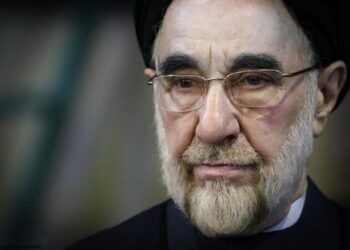was quietly released from an Iranian prison last fall and is now back in the United States.
The story of his release was reported for the first time Sunday by the Albany, New York, Times Union. Alaei, 37, had not spoken out previously because his brother, Arash, 42, also an AIDS researcher, remains in jail in Iran.
Kamiar spent 2 1/2 years incarcerated, including months of solitary  confinement.
confinement.
He has been living quietly in Albany the past few months completing his Ph.D. coursework in public health at the University of Albany. He has begun his doctoral dissertation and started a summer internship at the New York Department of Health’s AIDS Institute.
Kamiar told the newspaper he fears retribution against his brother if he publicly criticizes the regime. They were charged with plotting to overthrow the government in a one-day secret trial in December 2008. Kamiar was sentenced to three years and Arash to six.
In his first interview since being released, Alaei told the Times Union he was enjoying his freedom, but could not feel at peace while his brother is still behind bars. “I don’t feel I’m released until my brother gets released,” he said.
The brothers had previously worked and studied at the University of Albany. The university and Physicians for Human Rights joined in an international appeal that helped make the brothers’ imprisonment a cause celebre within the global medical community and at international AIDS conferences.
Kamiar made an emotional return to the campus last fall, when faculty and administrators celebrated his release at a small private party. “There was not a dry eye in the house,” said Philip Nasca, dean of the School of Public Health. “Everybody was delighted he was able to come back to pursue his degree.”
The two brothers were arrested by five secret policemen in plain clothes and unmarked cars a day apart in late June 2008 at their parents’ home in Ker-manshah. Kamiar Alaei had completed one year of his doctoral studies at UAlbany and was on a summer visit to Iran when he was detained.
He says the prison experience scarred him. His readjustment has been fraught with fear and flashbacks. “I struggle every day,” he told the Times Union. “When I sleep, I go back to prison in my mind.”
He says he was never tortured, but for the first couple of months was kept in solitary confinement in a 4-foot-by-6-foot cell with only a thin mat on a concrete floor. There was nothing else in the windowless cell. He was not allowed outside to exercise, was not given any reading material, and letters sent to him by his family and supporters were never delivered.
He said he kept himself sane by praying frequently, doing meditation exercises and playing a mental poetry game.
His father, Shaban, 75, a retired university professor of Persian literature, taught him to memorize a wide variety of poems when he was a boy. Alone in his cell, Alaei would recite a poem and whatever letter the poem ended on, he had to begin a new poem with that same letter. He mixed remembered poems with his own creations. The game, which he remembered fondly from childhood, turned into a long, unbroken chain of verse that occupied his time and kept his mind sharp.
Alaei’s mother, Shahdokt, kept tearful vigils outside the prison walls, even though she was not allowed to visit her sons.
When he was allowed out of solitary confinement at Evin, he was moved to a communal cell for 30 men that measured about 20-feet-by-20-feet. The inmates negotiated and argued each night over who got to sleep on the 18 cots. The inmates included hardened criminals and violent drug dealers.
Ironically, the Alaei brothers helped create compassionate prison programs in Iran to treat HIV-positive inmates. “I visited many prisons as a doctor to help the prisoners and now I was a prisoner myself. It made no sense,” he said.
Prison officials would not let Alaei to treat prisoners while incarcerated.
After eight months, he was transferred to the main prison unit. He saw his brother there, but guards never let them stay together for any extended periods. He also spoke briefly with Roxana Saberi, the Iranian-American freelance journalist released in May 2009 after being detained for three months.
The Alaei brothers had run AIDS clinics in Iran for years with the government’s blessing and even some financial support. In fact, the Islamic Republic was hailed globally for its progressive “harm reduction” treatment model that lowered HIV rates among drug users and slowed the spread of the disease.
The brothers attended global AIDS conferences, presented their research and gained international acclaim. They earned plaudits from the World Health Organization for developing regional cooperation in AIDS treatment among 12 Middle Eastern and Central Asian countries and were the subjects of a documentary.
At some point the government turned on them. Authorities cited the brothers’ attendance at numerous international AIDS conferences as evidence they were fomenting a velvet revolution and communicating with governments opposed to the Islamic Republic.
Arash has now reached the halfway point of his six-year sentence. The authorities may follow the Iranian tradition of an early release for first-time convictions. Family members and supporters began working for Kamiar’s release at the halfway mark of his three-year sentence, but it was another year before he was let go.
“This is an issue of global health, not politics,” said Susannah Sirkin of Physicians for Human Rights. “There are thousands of medical professionals around the world who have united behind freeing the Alaei brothers and we will not give up until Arash is free.”
His voice growing thick with emotion, Kamiar said, “We will have a big party once my brother is free.”














